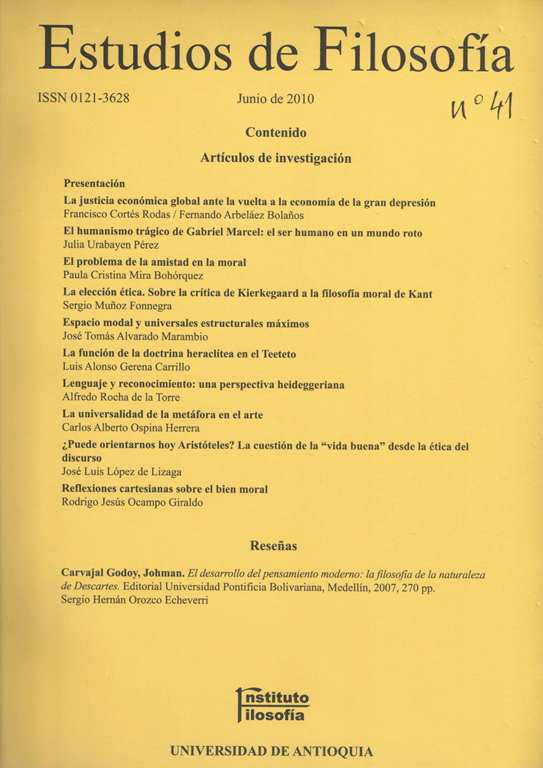¿Can Aristotle guide us? The ‘good life’ from the discursive ethics
DOI:
https://doi.org/10.17533/udea.ef.11610Keywords:
“good life”, ethics of discourse, self-deception, Aristotle, Habermas, TugendhatAbstract
This paper examines whether it is possible to approach the Aristotelian “good life” or happiness from the conceptual framework of postkantian Ethics: Ethics of discourse. The paper states that the contemporary Ethics only admits a subjectivistic conception of “good life” and it is incompatible with a rational treatment of it, such as Aristotle pretended. Then, it is stated that the question about “good life” can still be interesting for Contemporary Ethical Theory, if it is rede ned in terms of a theory of the formal conditions that must be ful lled by an autonomous determination of the “good life”, that is to say, a determination non-distorted by self-deception or false conscience. But again, the paper argues that, for such purpose, a psychological or social theory can be more relevant than an Aristotelian ethical approach.
Downloads
References
ADORNO, Th. W. (2003), Minima moralia, Frankfurt, Suhrkamp.
ARISTÓTELES (1985), Ética Nicomáquea. Ética Eudemia, trad. de J. Pallí, Madrid, Gredos.
AUBENQUE, P. (1999) La prudencia en Aristóteles, trad. de M. J. Torres, Barcelona, Crítica.
DUBY, G. (1992) Los tres órdenes, o lo imaginario del feudalismo, Madrid, Taurus.
GADAMER, H.T.G. (2002) Verdad y método II, trad. de M. Olasagasti, Salamanca, Sígueme.
HABERMAS, J. (1973) Legitimations probleme im Spätkapitalismus, Frankfurt, Suhrkamp.T
HABERMAS, J. (1994) “Teorías de la verdad”. En: Teoría de la acción comunicativa: complementos y estudios previos, Madrid, Cátedra.
HABERMAS, J. (1996) “Ética del discurso – Notas para un programa de fundamentación”. En: Conciencia moral y acción comunicativa, Barcelona, Península.
HABERMAS, J. (2000) “Del uso pragmático, ético y moral de la razón práctica”, en: Aclaraciones a la ética del discurso, Madrid, Trotta.
HABERMAS, J. (2001) Die Zukunft der menschlichen Natur, Frankfurt, Suhrkamp.
HOBBES, Th. (1994), Leviatán, México, FCE.
KANT, I. Crítica de la razón práctica (1995), trad. de M. García Morente, Salamanca, Sígueme.
KANT, I. (1994) Metafísica de las costumbres, trad. de A. Cortina y J. Conill, Madrid, Tecnos.
LAFONT, C. (2000) The Linguistic Turn in Hermeneutic Philosophy, Cambridge (Mass.), MIT Press.
LAFONT, C. (2002) “Realismo y constructivismo en la teoría moral kantiana: el ejemplo de la Ética del discurso”, Isegoría, 27, pp. 115-219 DOI: https://doi.org/10.3989/isegoria.2002.i27.557
LOCKE, J. (1992) Ensayo sobre el entendimiento humano, trad. de E. O’Gorman, México, FCE.
LÓPEZ DE LIZAGA, J. L.(2008) “Ética del discurso y realismo moral”, Logos, 41, pp. 65-86.
MACINTYRE, A. (2004) Tras la virtud, trad. de A. Valcárcel, Barcelona, Crítica.
NUSSBAUM, M.(1998) “Menschliches Tunundsoziale Gerechtigkeit”, in: H. Steinfath (ed.), Was ist ein gutes Leben?, Frankfurt, Suhrkamp.
PICO DE LLAMIRANDOLA, G. (2007) “Discurso sobre la dignidad del hombre”, en: Santidrián, P. (ed.). Humanismo y Renacimiento, Madrid, Alianza.
STEINFATH, H. (ed.) (1998) Was ist ein gutes Leben?, Frankfurt, Suhrkamp.
STRAUSS, L. (2000) Derecho natural e historia, Barcelona, Círculo de Lectores.
TUGENDHAT, E. (1988) “Ética antigua y moderna”, en: Problemas de la ética, Barcelona, Crítica.
TUGENDHAT, E. (1993) Vorlesungen über Ethik, Frankfurt, Suhrkamp.
Downloads
Published
How to Cite
Issue
Section
Categories
License
Copyright (c) 2010 José Luis López de Lizaga

This work is licensed under a Creative Commons Attribution-NonCommercial-ShareAlike 4.0 International License.
Authors who publish with this journal agree to the following terms:
1. The Author retains copyright in the Work, where the term "Work" shall include all digital objects that may result in subsequent electronic publication or distribution.
2. Upon acceptance of the Work, the author shall grant to the Publisher the right of first publication of the Work.
3. The Author shall grant to the Publisher a nonexclusive perpetual right and license to publish, archive, and make accessible the Work in whole or in part in all forms of media now or hereafter known under a Creative Commons Attribution-NoCommercia-ShareAlike (CC BY-NC-SA 4.0), or its equivalent, which, for the avoidance of doubt, allows others to copy, distribute, and transmit the Work under the following conditions: (a) Attribution: Other users must attribute the Work in the manner specified by the author as indicated on the journal Web site;(b) Noncommercial: Other users (including Publisher) may not use this Work for commercial purposes;
4. The Author is able to enter into separate, additional contractual arrangements for the nonexclusive distribution of the journal's published version of the Work (e.g., post it to an institutional repository or publish it in a book), as long as there is provided in the document an acknowledgement of its initial publication in this journal;
5. Authors are permitted, and Estudios de Filosofía promotes, to post online the preprint manuscript of the Work in institutional repositories or on their Websites prior to and during the submission process, as it can lead to productive exchanges, as well as earlier and greater citation of published work (see The Effect of Open Access). Any such posting made before acceptance and publication of the Work is expected be updated upon publication to include a reference to the Estudios de Filosofía's assigned URL to the Article and its final published version in Estudios de Filosofía.















